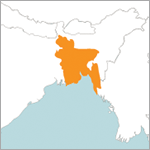
Between 2010–2014, FANTA focused on integrating and strengthening maternal and child nutrition in health service delivery in Bangladesh. Working with the Government of Bangladesh and development partners, FANTA created the Country Investment Plan—a road map for investment in food security, nutrition, and agriculture. FANTA also assisted the government in formulating the Health, Population, and Nutrition Sector Development Program, which included a new operational plan for mainstreaming and scaling up nutrition services throughout the country. Over these four years, our work focused on:
- Advocating for increased resources for nutrition at the national level. FANTA used PROFILES to estimate the economic and health consequences for Bangladesh of not adequately addressing malnutrition over a 10-year period, from 2011 to 2021. These estimates were then used at meetings with nutrition stakeholders and the media to convey the impact of nutrition on health, education, and development.
- Integrating maternal and child nutrition into USAID-funded health programs. FANTA trained more than 2,900 service providers in infant and young child feeding and hygiene practices. The project also completed a clinic readiness assessment to determine the extent to which training in infant and young child feeding was integrated into nutrition service delivery, and to identify challenges, gaps, and next steps.
- Strengthening the capacity of government institutions in nutrition. FANTA provided technical assistance to strengthen the government’s capacity to integrate nutrition into its health programs by supporting the distribution of iron/folic acid tablets to postpartum mothers, developing a basic nutrition training curriculum, and mapping the country’s nutrition interventions and projects.
Beginning in 2016, FANTA provided technical assistance to USAID/Bangladesh’s NGO Health Services Delivery Project (NHSDP) to increase the coverage and quality of nutrition services by building the capacity of service providers and clinics. The project’s technical assistance included:
- Supporting nutrition training for service providers for improved delivery of nutrition services
- Strengthening quality improvement and quality assurance through the development of tools and supportive supervision, processes, and documentation
- Improving monitoring and evaluation to strengthen nutrition service delivery
- Assessing improvements in NHSDP’s nutrition service delivery following enhanced activities
FANTA has also worked with its partner University of California, Davis, and icddr,br, researching the effectiveness of lipid-based nutrient supplements for improving nutrition among pregnant and lactating women and their children in Bangladesh, and produced several reports.


